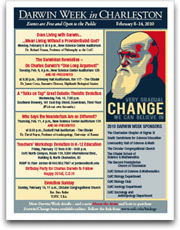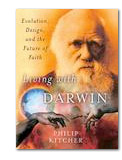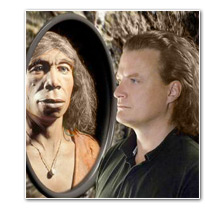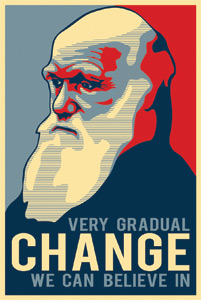2010 Poster

PDFs Available
Black+White Color
Please download & distribute.
2010 Event Venues
The New Science Center
College of Charleston
The recently opened
science building is at the intersection of Coming and Calhoun Streets, on the north side of Calhoun, across from the College library.
Grimsley & Duckett Halls –
The Citadel
The Citadel’s Grimsley Hall is located at the north end of Summerall Field, on Jenkins Avenue. Duckett Hall is at the corner of
Lee Avenue (the continuation of Moultrie Street) and Jones Avenue.
Maps of the CofC Campus and The Citadel are available online.
Southend Brewery
Southend Brewery is located at 161 East Bay Street, Downtown.
Circular
Congregational Church
Circular Congregational Church is located at 150 Meeting Street.
Darwin Links Worldwide
DarwinDay.org
From the Institute for Humanist Studies
Darwin200.org
London Natural History Museum
Darwinweek.com
University of Northern Iowa
Year of Darwin
Case Western Reserve
Darwin & Darwinism
Baruch College, New York
City University
Darwin 200
Nature Magazine Special
The Darwin Legend.org
Many articles & links here
Darwin-Online.org.uk
Complete Works, and Worldwide Links
Darwin Days
Cornell University & the
Paleontological Research Institution, Ithica, NY
Darwin 200 Ireland
Events in Ireland
Darwin 200 Torquay/Plymouth
S.W. U.K. Events
Darwin's Reach
Hofstra University Events
Does Living with Darwin Mean...
...Living Without a Providentialist God?
Monday, February 8 at 4:00 p.m.
New Science Center Auditorium
Dr. Richard Nunan
The ongoing hostility between some religious believers and evolutionary biology has been much more persistent than the corresponding hostility between religion and science during the era of the Copernican Revolution,  when the Earth was removed from its traditional location at the center of the universe. Philip Kitcher’s recent book, Living with Darwin: Evolution, Design and the Future of Faith, will be used to illustrate why the hostility generated since the publication of Origin of Species has been so much more profound than the earlier clash of worldviews which led to Galileo’s censorship before the Catholic Inquisition.
when the Earth was removed from its traditional location at the center of the universe. Philip Kitcher’s recent book, Living with Darwin: Evolution, Design and the Future of Faith, will be used to illustrate why the hostility generated since the publication of Origin of Species has been so much more profound than the earlier clash of worldviews which led to Galileo’s censorship before the Catholic Inquisition.
Dr. Richard Nunan is Professor of Philosophy at the College of Charleston. He teaches and writes in the areas of philosophy of law, history & philosophy of science, gender studies, and philosophy in film.
The Darwinian Revelation
On Darwin’s “One Long Argument”
Tuesday, February 9 at 4:00 p.m.
New Science Center Auditorium 129
and
Tuesday, February 9 at 6:30 p.m.
Grimsley Hall Auditorium, Rm 117 - The Citadel
(Reception @ 6:15 p.m., Grimsley Hall Rm 204 )
Dr. James T. Costa
Charles Darwin’s On the Origin of Species is perhaps the least-read revolutionary book ever published. The book’s appearance in 1859 ushered in a new way of looking at the world, and at ourselves. In this talk Dr. Costa considers the development of Darwin’s insights that culminated in the Origin, a book Darwin regarded as “one long argument.” In tracing Darwin’s personal process of discovery and his strategy in pitching his argument in the Origin and beyond, he shows how Darwin’s insights hold relevance for how we teach evolution today.
Dr. Jim Costa is Executive Director of the Highlands Biological Station in Highlands, North Carolina, and Professor of Biology at Western Carolina University in Cullowhee, North Carolina. An entomologist with a special interest in social caterpillars and sawflies, he is the author of “The Annotated Origin” (Harvard 2009), an edition of the Origin of Species designed to help readers better understand the historical context, structure, and content of Darwin’s masterwork.
Dr. Costa’s talks are sponsored by the Department of Biology, College of Charleston, and The Citadel School of Science and Mathematics
A “Talks on Tap” Great Debate:
Theistic Evolution
Wednesday, February 10 at 7:00 p.m.
Southend Brewery, Third Floor
161 East Bay Street, Downtown
(With our own bartender)
What people of faith believe about the origin and diversification of life on Earth is not as simple as being for or against Darwinian evolution. Some believers see no conflict between their holy books and scientific journals — embracing the research of scientists and theologians as equal but different spheres. Many religious people are also attracted to a concept known as “Theistic Evolution,” accepting Darwinian mechanisms as Godís creative process. However, more conservative religious thinkers have labeled this a denial of Biblical truth and a grave heresy. PCUSA Presbyterian Dr. Rob Dillon will debate ARP Presbyterian Dr. Mark Ross to resolve the weighty question as to whether Theistic Evolution is compatible with faith in the Bible.
Dr. Rob Dillon is Associate Professor of Biology at the College of Charleston and coordinator of Darwin Week. He serves as President of the South Carolinians for Science Education, Trustee of the St. Andrews Constituent District School Board, and Tenor in the First (Scots) Presbyterian Kirk Choir.
Dr Mark E. Ross is Associate Dean and Associate Professor of Systematic Theology at the Columbia campus of Erskine Theological Seminary and Director of the Institute for Reformed Worship.
Talks on Tap is a program of The Second Presbyterian Church of Charleston
Who Says the Neandertals Are so Different?
Thursday, February 11 at 4:00 p.m.
New Science Center Auditorium 129
and
Thursday, February 11 at 6:30 p.m.
Duckett Hall Auditorium – The Citadel
Dr. David Frayer
 Neandertals have been considered the poor cousins of Europeans since their first discovery in 1856. What could be worse that being called a "Neandertal" or a worse insult than "even a cave man can do it?" Yet, much new research about these fossils has shown they are not as brutal nor as simple minded as commonly assumed. Maybe, being a Neandertal was not so bad after all?
Neandertals have been considered the poor cousins of Europeans since their first discovery in 1856. What could be worse that being called a "Neandertal" or a worse insult than "even a cave man can do it?" Yet, much new research about these fossils has shown they are not as brutal nor as simple minded as commonly assumed. Maybe, being a Neandertal was not so bad after all?
Dr. David Frayer is Professor of Anthropology at the University of Kansas. He has conducted research on fossils from Europe, Asia and Africa, but now focuses mainly on the Krapina Neandertals (Croatia) and on problems centered on the relationship between Neandertal and modern populations.
Sponsored by the Charleston Chapter of Sigma Xi, the Scientific Research Society
Expelled Exposed!

Friday, February 12 at 6 p.m.
CofC Education Center, Room 118
25 St. Philip Street
See Ben Stein's (2008) pseudo-documentary Expelled with subtitle track by Bogosity TV, based on the National Center for Science Education's Expelled Exposed website: a detailed look at why the Ben Stein movie is not a documentary at all, but anti-science propaganda aimed at creating the appearance of controversy where there is none.
Refreshments will be served.
Sponsored by the College of Charleston Biology Club
Evolution in K-12 Education
A Workshop for Teachers
Friday, February 12 at 6-9:00 p.m.
CofC North Campus, Room 139
5300 International Boulevard, Building B
North Charleston, SC
Join us for a series of presentations and hands-on activities directed toward enriching the evolutionary component of science education at the secondary level, led by College of Charleston faculty: Dr. William Veal (Education), Drs. Rob Dillon and John Peters (Biology) and Dr. Mitchell Colgan (Geology).
Teachers interested in attending, RSVP by February 9 to Starr Jordan 953-7847 or jordans@cofc.edu
Birthday Party for Charles Darwin to Follow
Happy 201st C.D.!!
Evolution Sunday
Circular Congregational Church
Sunday, February 14 at 11:00 a.m.
Circular Congregational Church
Topic T.B.A.
Rev. Bert Keller
Christian faith has both understood and expressed itself in terms of the culture it lives in. Sometimes theology has run ahead of the culture, and at other times the culture has run way ahead of theology ó and helped change ways of thinking about God. The most productive interactions occur when they are running together and talking while they run.
Rev. Keller has participated in Darwin Week for several years. He has examined the interplay of faith and science, the evolutionary aspects of God and church, and is sure to bring great insight and interest to the discussion again this year.


 when the Earth was removed from its traditional location at the center of the universe. Philip Kitcher’s recent book,
when the Earth was removed from its traditional location at the center of the universe. Philip Kitcher’s recent book,  Neandertals have been considered the poor cousins of Europeans since their first discovery in 1856. What could be worse that being called a "Neandertal" or a worse insult than "even a cave man can do it?" Yet, much new research about these fossils has shown they are not as brutal nor as simple minded as commonly assumed. Maybe, being a Neandertal was not so bad after all?
Neandertals have been considered the poor cousins of Europeans since their first discovery in 1856. What could be worse that being called a "Neandertal" or a worse insult than "even a cave man can do it?" Yet, much new research about these fossils has shown they are not as brutal nor as simple minded as commonly assumed. Maybe, being a Neandertal was not so bad after all?